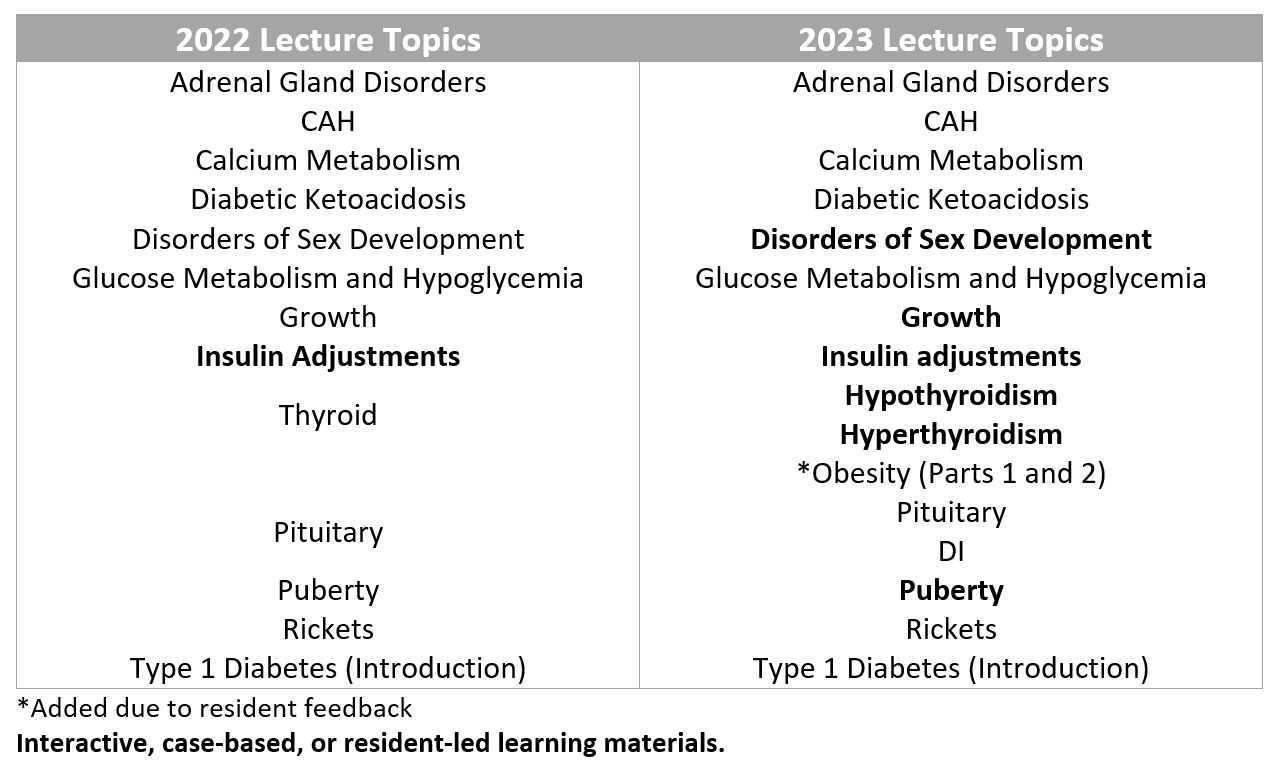Global Neonatal & Children's Health
Session: Global Neonatal & Children's Health 3
506 - Development and Modification of a Pediatric Endocrinology Curriculum for Pediatric Residents in Rwanda
Friday, May 3, 2024
5:15 PM - 7:15 PM ET
Poster Number: 506
Publication Number: 506.430
Publication Number: 506.430
- MC
Melinda Chen, MD
University of Wisconsin School of Medicine and Public Health
Verona, Wisconsin, United States
Presenting Author(s)
Background: Rwanda has one pediatric endocrinologist for a population < 18 years of 5.4 million. Thorough subspecialty education for residents is essential to optimize patient care. Before 2020, consistent, complete endocrinology teaching was not available. The University of Rwanda Pediatric Residency seeks to provide comprehensive education appropriate for adult learning. A teaching team based in the United States and Rwanda is forming an endocrinology curriculum modeled on AAP learning objectives and adapted to low-resource settings. A full curriculum was launched in 2022, and flipped classroom, case-based, or learner-led activities were introduced in 2023 to improve engagement.
Objective: We aim to optimize curriculum quality and adaptation of didactic materials to the low-resource setting by soliciting feedback annually from resident learners.
Design/Methods: The teaching team taught 13 endocrine topics in 2022 and 16 topics in 2023 (Table), with feedback solicited each year. Residents give informed consent before completing 10-question pre- and post-module knowledge assessments and giving lecture and module feedback based on a 5-point Likert scale. Lecture feedback assessed content, delivery, and applicability to the Rwandan setting, while end-of-module feedback evaluated the scope and didactic value of the curriculum as a whole. Data is collected annually from each class of learners to inform ongoing improvement.
Results: Early resident feedback was positive before and after adding learner-led activities in 2023. We saw opportunities to improve breadth of topics (mean ± SD 3.5 ± 0.7 in 2022, N=2, 4.7 ± 0.58 in 2023, N = 3) and practical utility of teaching (mean + SD 3.5 ± 0.7 in 2022, N = 2, 4.7 ± 0.6 in 2023, N = 3), but residents were pleased with the depth of teaching of physiology (mean ± SD 4.0 ± 0.0 in 2022, N = 2, 4.3 ± 0.6 in 2023, N = 3). Residents requested addition of new topics in 2022, but expansion of existing topics in 2023. Data analysis and collection is ongoing.
Conclusion(s): Comprehensive, practical subspecialty teaching is essential for trainees in low-resource settings, yet many materials and most current research does not easily meet this need. The pediatric endocrinology curriculum has been well received, and residents identify areas for ongoing development and change each year. Analysis of change in receptivity, engagement, and knowledge are currently limited due to small class sizes, but will be judged on a cumulative basis in future years. Future questions will include perspectives of former residents after time spent in real-world practice.

